This article was co-authored by Roy Nattiv, MD. Dr. Roy Nattiv is a Board-Certified Pediatric Gastroenterologist in Los Angeles, California. With over 20 years of experience he specializes in a broad range of pediatric gastrointestinal and nutritional illnesses such as constipation, diarrhea, reflux, food allergies, poor weight gain, SIBO, IBD, and IBS. He completed his pediatric residency at the Children’s Hospital at Montefiore, Albert Einstein College of Medicine in New York, and his fellowship at the University of California, San Francisco (UCSF). While at UCSF, he was a California Institute of Regenerative Medicine (CIRM) fellowship trainee and was awarded the North American Society for Pediatric Gastroenterology, Hepatology, and Nutrition (NASPGHAN) Fellow to Faculty Award in Pediatric IBD Research. Dr. Nattiv received his undergrad degree from the University of California, Berkeley, and his medical degree (MD) from the Sackler School of Medicine in Tel Aviv, Israel.
There are 9 references cited in this article, which can be found at the bottom of the page.
wikiHow marks an article as reader-approved once it receives enough positive feedback. In this case, 100% of readers who voted found the article helpful, earning it our reader-approved status.
This article has been viewed 72,701 times.
Pancreatitis is a disease in which the pancreas (the large gland that helps with digestion and controls how food is used for energy) becomes inflamed and can’t work properly. There are two types: acute (sudden, short inflammation) and chronic (long-lasting inflammation). Pancreatitis is mainly caused by either gallstones and chronic alcohol consumption, but can also be caused by hypercalcemia.
Steps
Staying Away from Foods That Cause Pancreatitis
-
1Avoid excessive alcohol. There is a very clear link between excessive drinking and pancreatitis. Reducing your alcohol intake is one of the most important things you can do for your body if you are prone to pancreatitis. About seven out of 10 cases of chronic pancreatitis are the result of long-term, heavy drinking.[1]
- Alcohol and biliary disease are the number one and number two causes of pancreatitis. Try to eliminate all alcohol from your diet.
- Cigarettes increase the negative effects of alcohol on the pancreas, so it’s also important to stop smoking.
- If you or someone you know drinks excessively, it may be time to seek help. Seek help from a rehab facility or a recovery group such as Alcoholics Anonymous.
-
2Learn the connection between gallstones and pancreatitis. Gallstones are one of the major reasons that acute pancreatitis occurs. They occur when too much cholesterol builds up in your bile (the stuff in your liver that helps digest fats). You can eliminate gallstones by taking medication or by having your gallbladder removed. Gall bladder surgery is commonplace and carries the risk of infection and bleeding, but otherwise it is safe procedure.[2]Advertisement
-
3Educate yourself on hypercalcemia and its causes. If you have hypercalcemia, this means that the calcium level in your blood is higher than normal. It's most common in women over 50, and can be caused by overactive parathyroid glands, some cancers, and severe dehydration among other things.[3] Hypercalcemia rarely causes pancreatitis, but when it does, the pancreatitis is typically severe.[4]
- Hypercalcemia rarely comes with symptoms, but they could include bone pain or muscle weakness, excessive thirst, nausea, or heart problems among others. Ask your doctor for a blood test if you suspect you might have hypercalcemia and be vigilant for signs of pancreatitis as well.
-
4Avoid fatty or fried foods. Anything high in saturated or trans fats is a no-no if you are prone to pancreatitis. Particularly if you are recovering from one attack, fatty foods can cause another bout of pancreatitis. Try to skip foods such as these:[5]
- Fatty meats, such as organ meat, bacon, pepperoni, and salami
- Greasy foods, such as burgers and french fries
- Foods high in trans fats, such as packaged baked goods, fast food, and frozen pizza
- Full-fat milk, yogurt, or cheese
-
5Limit foods with lots of simple sugar. Foods high in simple sugars increase you triglyceride levels (the amount of fat carried in your blood), which can lead to gallstones and pancreatitis. These include sugary sweets and high-calorie beverages. Some big ones to skip include[6]
- Soda
- Cakes, cookies, and pies
- Candy
- Processed foods like jams and some condiments
-
6Don’t crash diet. If you’re trying to lose weight, you should do so gradually, or your body will freak out. Rapid weight loss can cause your liver to overproduce cholesterol, which will increase your risk of gallstones.[7]
Choosing Foods That Improve Pancreatic Health
-
1Eat lots of whole grains. White flour can send your triglyceride levels (the amount of fat carried in your blood) through the roof, which can lead to pancreatitis attacks. Skip white bread and any cereal, rice, or pasta made with refined white flour. Opt for whole grain versions of these foods instead.[8]
-
2Eat plenty of fresh fruits and vegetables. In particular, look for foods high in vitamin B and iron (like leafy greens). Most fruits and vegetables are full of antioxidants, which help prevent pancreatitis attacks. In particular, try to eat[9]
- Greens
- Berries and cherries
- Tomatoes
- Squash
- Bell peppers
-
3Drink water. The National Pancreas Foundation recommends that anyone who has ever been diagnosed with pancreatitis keep a water bottle with them at all times to avoid dehydration (which causes flare ups). Gatorade and other sports drinks are also okay, but watch out for high sugar content.[10]
Expert Q&A
Did you know you can get expert answers for this article?
Unlock expert answers by supporting wikiHow
-
QuestionHow do you treat pancreatitis?
 Roy Nattiv, MDDr. Roy Nattiv is a Board-Certified Pediatric Gastroenterologist in Los Angeles, California. With over 20 years of experience he specializes in a broad range of pediatric gastrointestinal and nutritional illnesses such as constipation, diarrhea, reflux, food allergies, poor weight gain, SIBO, IBD, and IBS. He completed his pediatric residency at the Children’s Hospital at Montefiore, Albert Einstein College of Medicine in New York, and his fellowship at the University of California, San Francisco (UCSF). While at UCSF, he was a California Institute of Regenerative Medicine (CIRM) fellowship trainee and was awarded the North American Society for Pediatric Gastroenterology, Hepatology, and Nutrition (NASPGHAN) Fellow to Faculty Award in Pediatric IBD Research. Dr. Nattiv received his undergrad degree from the University of California, Berkeley, and his medical degree (MD) from the Sackler School of Medicine in Tel Aviv, Israel.
Roy Nattiv, MDDr. Roy Nattiv is a Board-Certified Pediatric Gastroenterologist in Los Angeles, California. With over 20 years of experience he specializes in a broad range of pediatric gastrointestinal and nutritional illnesses such as constipation, diarrhea, reflux, food allergies, poor weight gain, SIBO, IBD, and IBS. He completed his pediatric residency at the Children’s Hospital at Montefiore, Albert Einstein College of Medicine in New York, and his fellowship at the University of California, San Francisco (UCSF). While at UCSF, he was a California Institute of Regenerative Medicine (CIRM) fellowship trainee and was awarded the North American Society for Pediatric Gastroenterology, Hepatology, and Nutrition (NASPGHAN) Fellow to Faculty Award in Pediatric IBD Research. Dr. Nattiv received his undergrad degree from the University of California, Berkeley, and his medical degree (MD) from the Sackler School of Medicine in Tel Aviv, Israel.
Board Certified Gastroenterologist Often, patients with acute pancreatitis are hospitalized. The mainstay of therapy is aggressive hydration and a low-fat diet. So less than 30 grams a day to treat acute pancreatitis. If they have complications, such as an infected pancreas, or if they have a gallstone that's causing the pancreatitis, they might need antibiotics or some further intervention by a gastroenterologist. As far as chronic pancreatitis, it's similar but with chronic pancreatitis, because you get these changes in the structure of the pancreas, very often you need surgery to drain cysts that might form around the pancreas, or sometimes because you're not making pancreatic enzymes anymore to digest fat, you have to take the pancreatic enzymes by mouth.
Often, patients with acute pancreatitis are hospitalized. The mainstay of therapy is aggressive hydration and a low-fat diet. So less than 30 grams a day to treat acute pancreatitis. If they have complications, such as an infected pancreas, or if they have a gallstone that's causing the pancreatitis, they might need antibiotics or some further intervention by a gastroenterologist. As far as chronic pancreatitis, it's similar but with chronic pancreatitis, because you get these changes in the structure of the pancreas, very often you need surgery to drain cysts that might form around the pancreas, or sometimes because you're not making pancreatic enzymes anymore to digest fat, you have to take the pancreatic enzymes by mouth. -
QuestionI haven't smoked for 22 years and haven't had alcohol for five years. I have pancreas division and had a stent put in twice. I still have bouts of acute pancreatitis. What else can I do?
 Chris M. Matsko, MDDr. Chris M. Matsko is a retired physician based in Pittsburgh, Pennsylvania. With over 25 years of medical research experience, Dr. Matsko was awarded the Pittsburgh Cornell University Leadership Award for Excellence. He holds a BS in Nutritional Science from Cornell University and an MD from the Temple University School of Medicine in 2007. Dr. Matsko earned a Research Writing Certification from the American Medical Writers Association (AMWA) in 2016 and a Medical Writing & Editing Certification from the University of Chicago in 2017.
Chris M. Matsko, MDDr. Chris M. Matsko is a retired physician based in Pittsburgh, Pennsylvania. With over 25 years of medical research experience, Dr. Matsko was awarded the Pittsburgh Cornell University Leadership Award for Excellence. He holds a BS in Nutritional Science from Cornell University and an MD from the Temple University School of Medicine in 2007. Dr. Matsko earned a Research Writing Certification from the American Medical Writers Association (AMWA) in 2016 and a Medical Writing & Editing Certification from the University of Chicago in 2017.
Family Medicine Physician Unfortunately, sometimes pancreatitis does not respond to therapy. You may have done too much damage to your pancreas when you were drinking and smoking. Talk to you doctor, there may be some surgical options out there. For chronic pancreatitis, some doctors recommend resection of part of the pancreas.
Unfortunately, sometimes pancreatitis does not respond to therapy. You may have done too much damage to your pancreas when you were drinking and smoking. Talk to you doctor, there may be some surgical options out there. For chronic pancreatitis, some doctors recommend resection of part of the pancreas. -
QuestionWill spaghetti sauce cause an attack?
 Chris M. Matsko, MDDr. Chris M. Matsko is a retired physician based in Pittsburgh, Pennsylvania. With over 25 years of medical research experience, Dr. Matsko was awarded the Pittsburgh Cornell University Leadership Award for Excellence. He holds a BS in Nutritional Science from Cornell University and an MD from the Temple University School of Medicine in 2007. Dr. Matsko earned a Research Writing Certification from the American Medical Writers Association (AMWA) in 2016 and a Medical Writing & Editing Certification from the University of Chicago in 2017.
Chris M. Matsko, MDDr. Chris M. Matsko is a retired physician based in Pittsburgh, Pennsylvania. With over 25 years of medical research experience, Dr. Matsko was awarded the Pittsburgh Cornell University Leadership Award for Excellence. He holds a BS in Nutritional Science from Cornell University and an MD from the Temple University School of Medicine in 2007. Dr. Matsko earned a Research Writing Certification from the American Medical Writers Association (AMWA) in 2016 and a Medical Writing & Editing Certification from the University of Chicago in 2017.
Family Medicine Physician
References
- ↑ https://www.drinkaware.co.uk/check-the-facts/health-effects-of-alcohol/effects-on-the-body/alcohol-and-pancreatitis
- ↑ https://www.mayoclinic.org/diseases-conditions/pancreatitis/multimedia/pancreatitis-caused-by-gallstones/img-20007560
- ↑ https://my.clevelandclinic.org/health/diseases/14597-hypercalcemia
- ↑ http://www.sciencedirect.com/science/article/pii/S2444050715000844
- ↑ https://www.hopkinsmedicine.org/health/conditions-and-diseases/pancreatitis
- ↑ https://health.clevelandclinic.org/best-and-worst-foods-for-pancreatitis-pain/
- ↑ https://www.nhs.uk/conditions/gallstones/treatment/
- ↑ https://columbiasurgery.org/news/2013/04/11/help-take-pain-out-pancreatitis-your-diet
- ↑ https://health.clevelandclinic.org/best-and-worst-foods-for-pancreatitis-pain/
About This Article
To avoid foods that cause pancreatitis, you should stay away from fatty and fried foods, such as fast food, frozen pizza, bacon, pepperoni, and salami, which are high in saturated and trans fats. You should also try to limit foods with simple sugars, like soda, cakes, cookies, candy, and processed foods, since these increase the fat in your blood. It’s okay to eat these as an occasional treat but try to cut down as much as possible. Instead, supplement your diet with whole grain cereals, rice, pasta, and bread, which are much healthier than the white flour versions. Also try and eat plenty of fresh fruit and vegetables which are high in vitamin B and iron, like berries, cherries, tomatoes, and bell peppers. For more tips from our Medical co-author, including how to diet safely to treat pancreatitis, read on!
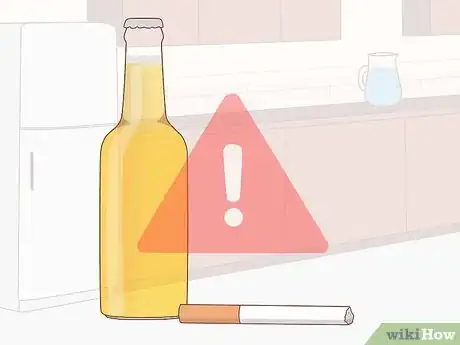
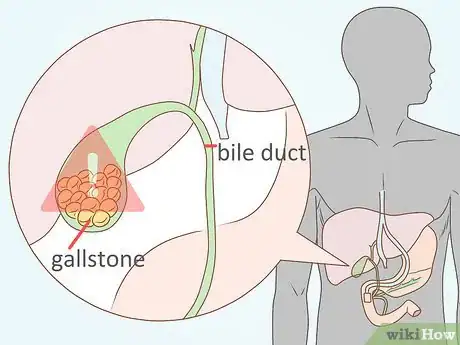
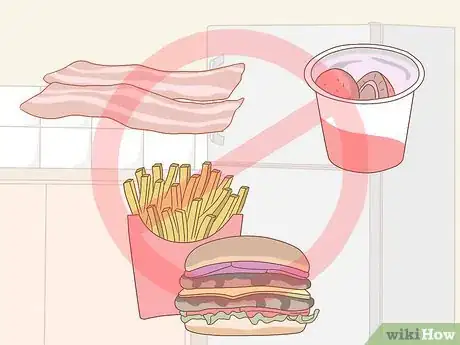
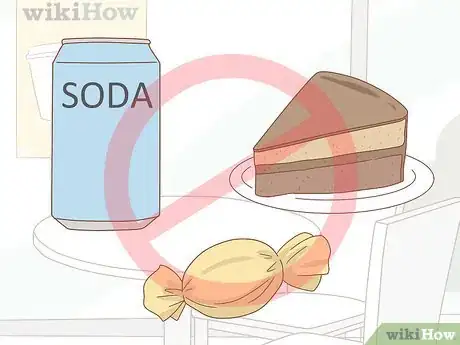
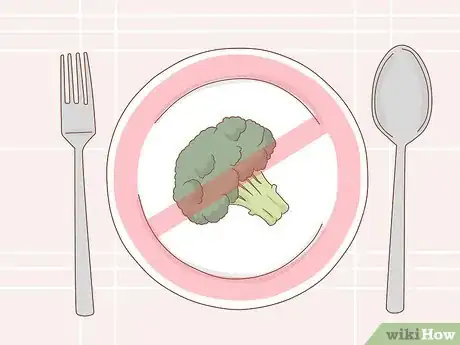
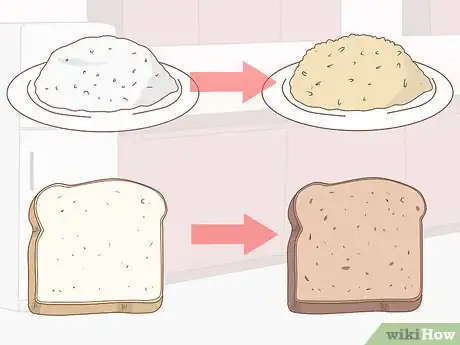
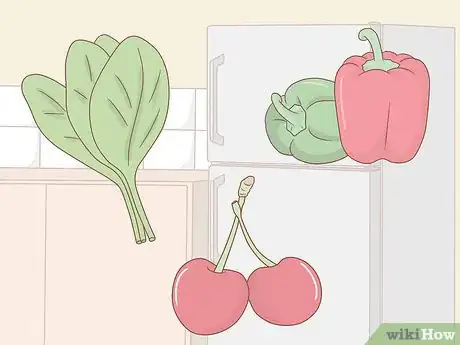
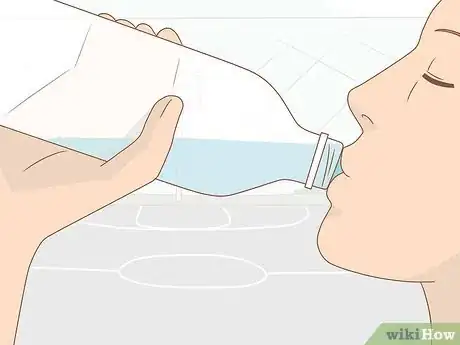
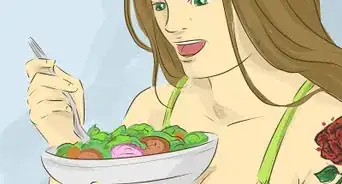

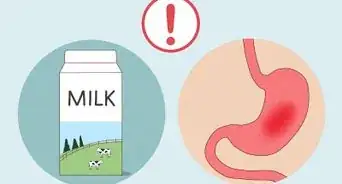
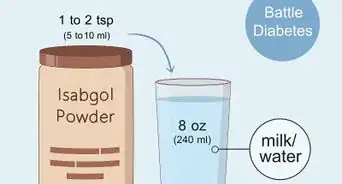


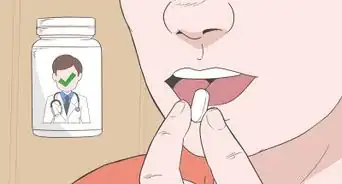



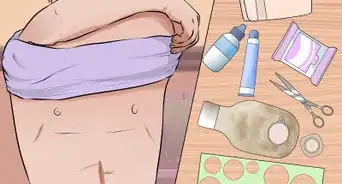
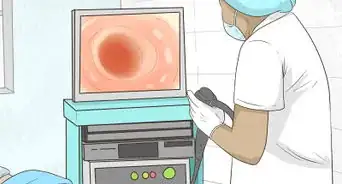

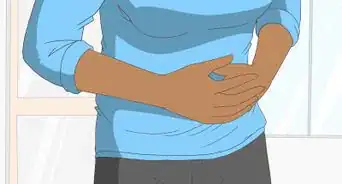











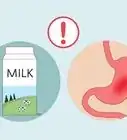
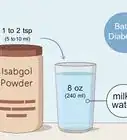



































Medical Disclaimer
The content of this article is not intended to be a substitute for professional medical advice, examination, diagnosis, or treatment. You should always contact your doctor or other qualified healthcare professional before starting, changing, or stopping any kind of health treatment.
Read More...